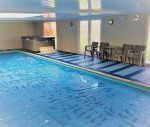
Incredible hyacinth blue flowering Jacaranda trees in Malta during early summer
Malta is the smallest country in the European Union. It has a lengthy history connecting it with Britain and everyone speaks English.
Its capital city, Valletta, unsurprisingly is the smallest capital city in the EU covering an area of less than 600 sq m. It is easily covered on foot. There are actually 7 Maltese islands making up the archipelago, 3 of which are inhabited: Malta, Gozo and Comino.
A little history
For centuries Malta was under the control of one foreign power after another. Its megalithic temples tell of a people who inhabited the island between 3800 and 2500 BC. Later came a wave of Phoenicians and Carthaginians, followed by the Romans.
St. Paul was shipwrecked on the island in 60 AD bringing Christianity. Arabs, Normans, Angevins, Aragonese, Castilians followed until the King of Spain gave Malta to the Knights of the Order of St John, who built Mdina and many fortified towers around the island. The Knights fought off marauding Ottoman Turks and ruled until Napoleon came along and took over in 1798.
The British led by Nelson liberated Malta and it became part of the British Empire. Its harbour was extended and redeveloped providing a strategic position in the Meditteranean. With the advent of WWII, Valletta and Malta suffered heavy bombardment forcing its population to hide in tunnels and caves in the rock. Malta became independent in 1964 and a member of the European Union on the 1st of May 2004.
Each wave of invasion wrought changes on the island. These are evident in its ruins, buildings, language, laws and culture, making Malta a fantastic history theme park. We should encourage families with children to visit Malta and learn history in an enjoyable manner - it simply oozes out of every crack and crevice.
Visitors arriving at the airport often receive a free mini guide to visitor attractions, services and events in Malta to help you get the most out of your visit.
If you're visiting for the first time you may wish to read some essential information about everyday life on Malta; about currency, the water etc.
Getting around Malta.
Malta is a small island ( see map) that is easily traversed using either the very good and cheap local bus services, car hire or taxi.
Nature on Malta - devise your own nature trek. It does not matter which part of rural Malta you walk through; there will be all kinds of flora and fauna to identify and enjoy. Take a camera to photograph what you see and identify the creatures and plants thta you do not recognize later.
Malta is predominantly Roman Catholic as any visitor soon realizes. There are numerous churches, religious plaques beside front doors and statues of the Virgin Mary or a saint on street corners. Christmas in Malta is a special holiday. Rent a self-catering apartment or villa in Malta for Christmas to see something of Maltese culture and family life.



